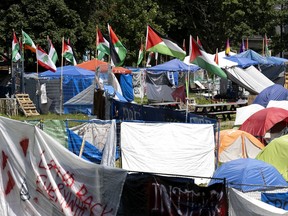[ad_1]
Breadcrumb Trail Links
News Local News
According to Environment and Climate Change Canada, Alberta has had an ‘abnormally dry’ 2023 thus far

Article content
Drought conditions have prompted the City of Calgary to curtail its water use this summer — and it’s encouraging residents to do the same.
Advertisement 2
Article content
The city moved its drought monitoring dial from “normal” to “dry” conditions on Thursday due to drier weather and higher temperatures as of late. The city said the decision was made amid observations of increasing water demand, low precipitation levels, below-average flows in the Bow and Elbow Rivers and low levels at upstream reservoirs.
Article content
To conserve water, city crews are reducing their watering of flowers, turfs and sports fields, moderating flow from decorative fountains and cutting back on watering newly planted trees and grass. The city is also limiting its washing of city vehicles and buses, and curtailing outdoor watering at city-owned buildings.
“Despite the moments of intense rain fall through July, our monitoring team continues to see impacts of this year’s dry conditions across Calgary and the region,” said the city’s water resources planner, Sarah Marshall. “Right now, Calgary’s reservoir water levels are within normal range, and we want to keep them there. By working together to conserve water use in Calgary today, the better the chance it won’t impact how we and the region would use water later in the season.”
Article content
Advertisement 3
Article content
City urges Calgarians to reduce water use
While the city is encouraging residents to keep a closer eye on their water use, there are currently no mandatory water restrictions in place. If drought conditions persist, the city may implement mandatory restrictions, though it said the timing and necessity of those limitations are still being considered.
Water use can increase by 50 per cent through the summer, according to the city.
“We’re all impacted by drought conditions, and we can all choose to support our rivers and water supply,” said Marshall. “If we all take some small steps in reducing our outdoor water use, it will not only benefit our community but also our neighbours downstream in southern Alberta.”
The city noted the following ways residents can limit their outdoor water use:
Advertisement 4
Article content
The city said the current focus is on water quantity, not quality, and the city’s water treatment plants currently continue to meet the demand for safe, high-quality drinking water. It’s planning to ramp up its efforts to monitor drought conditions to manage available water supply at the currently full Glenmore Reservoir and other city-owned infrastructure.
Alberta ‘abnormally dry’
According to Environment and Climate Change Canada, Alberta has had an “abnormally dry” 2023 thus far. Calgary received just more than a third of its typical precipitation levels through the spring. Summer has been much the same, with Calgary seeing 66 per cent of its usual June rainfall and less in July.
“Areas in southern Alberta are generally in the 30 to 40 per cent of normal range so far in July,” said Justin Shelley, a meteorologist with the federal weather agency. “It was a very dry spring, and it’s transitioning into a dry summer in most parts of southern Alberta.”
Rain is in the forecast, however, over the next couple of days.
Environment Canada noted chances of showers and potential thunderstorms amid cooler temperatures Thursday, and Friday’s forecast shows rain and a high of 16 C. Saturday and Sunday are forecasted to be sunny with highs in the mid-20s.
mrodriguez@postmedia.com
Twitter: @MichaelRdrguez

Experts foresee more heat waves outside summer as May hot spell grips B.C., Alberta
‘Tenaciousness of winter’: Weather Network forecasts a delayed spring
Article content
Share this article in your social network
[ad_2]
Source link





















